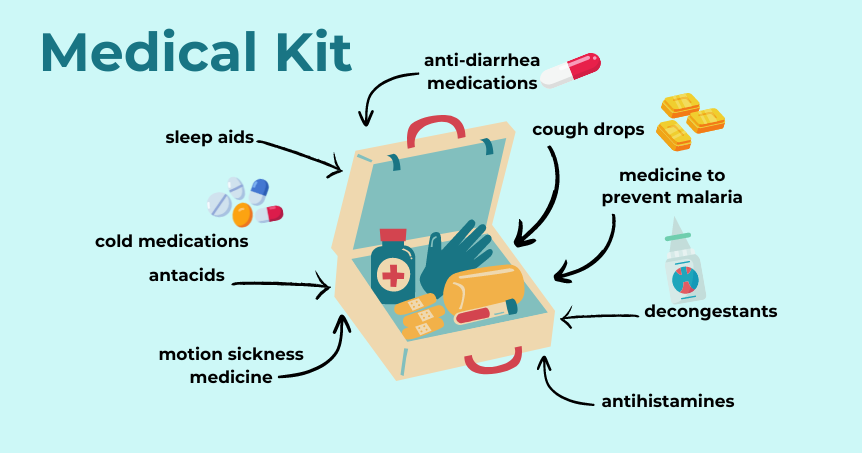Tips for Travelling
Whether you are planning a trip nearby, or a distant country, Grace Health Centre wants to equip you with the basic knowledge on how to stay safe and healthy during your traveling adventures. We will provide you tips to help you prevent a trip to the hospital, and allow you to have the best adventure!
Before your adventure
We recommend that you visit your family doctor at least 1 month before you travel to countries outside Canada to ensure you are up-to-date on your routine vaccinations, and to ask if you need any travel vaccinations to help boost your immune system.
An easy method that may help to support your immune system is by taking Vitamin C supplements.
Routine vaccines can help protect you against many health risks in your day-to-day life, and especially in new areas.
- COVID-19
- Chickenpox (Varicella)
- Hepatitis A
- Hepatitis B
- Human Papillomavirus (HPV)
- Influenza
- Measles, mumps, Rubella
- Meningococcal
- Pneumococcal
- Polio
- Rotavirus
- Tetanus, diphtheria, pertussis
- Shingles (Zoster)
Our clinic has many vaccines in stock! Book an appointment with your family doctor to inquire about these routine vaccinations and if you are up-to-date on your immunizations.
For more information on the vaccines listed above, please visit our Vaccination page on our website.
Travel Vaccines
Typhoid fever is a serious, sometimes life-threatening disease caused by Salmonella typhi. This bacteria is most commonly found in countries where there may be poor food handling and storage, as well as inadequate water sanitation. Symptoms include high fever, headache, weakness, loss of appetite, constipation or diarrhea or a rash. Typhim Vi helps protect children and adults from being infected from the typhoid fever bacteria, and should be given at least 2 weeks before you leave.
Immunization is recommended for those traveling to South Asia, Africa, Asia, Central or South America or some Eastern European countries.
At our clinic, we have Typhim Vi available as a travel vaccine. Please be aware that our Typhim Vi vaccine costs $50. Consultation visits to speak to the doctor about which travel vaccines you should get are also not covered by OHIP.
Treatment for Typhoid fever can be treated with antibiotics. If you suspect you may have Typhoid fever, book an appointment with your family doctor!
Additional information on travel vaccines can be found on the Centres for Disease Control and Preventions website. Please note, additional travel vaccines other than Typhim Vi are typically not covered by OHIP, and are paid out-of-pocket.
You can search additional travel tips by location using “Destinations” on the Centres for Disease and Preventions website.
Pack a Medical Kit
Packing a medical kit for your adventure can ensure that you are prepared for any minor illness! This medical kit should have any of your regular prescription medical you take at home, as well as over-the-counter medications that may help you on your trip.
Other items to include in your medical kit includes: Mosquito repellent products & afterbite (1% hydrocortisone cream), sunscreen & aloe vera, condoms, antibacterial or antifungal ointments, antiseptic wonder leaner, bandages, eye drops and tweezers.
Insect Repellent:
- DEET-based repellents
- Look for 20-30% DEET concentration for optimal protection
- Permethrin-treated clothing
- Mosquito net
- After-bite treatment

During your adventure
Protect Against Bacteria
One of the most effective ways to prevent the spread of infections is through good hand hygiene. This means thoroughly washing your hands with soap and warm water, and regularly sanitizing your hands.
Tip: Carry travel-sized hand sanitizer on you at all times!
Take precautions in public spaces for infection, as these are high risk locations for bacteria and viruses transmission. Consider using a disinfectant to clean frequently touched surfaces around you, such as your hotel room, airplane seats, and rental cars.
Food Poisoning
One of the most common sources of digestive issues while traveling includes drinking water, and even ice. Many regions do not have standard sanitation methods that your body is used to in your home country.
When traveling, only drink from bottled or filtered water – the purity of ice can also be questionable so ask for drinks without ice to decrease your risk of diarrhea, salmonella, cholera, etc.
Things to Keep in Mind:
- Brushing teeth: Use bottled water.
- Shower smarts: Keep your mouth closed during showers in areas with questionable water quality
- Tea and coffee: Generally safe if made with boiling water, but beware of added tap water or unsafe milk
Prevent Food Contamination
Food contamination is another cause of digestive issues – be careful of what you eat as some food may cause diarrhea, salmonella and cholera!
Ensure your food is cooked thoroughly and avoid raw fruit and vegetables washed with untreated water.
Tips for Food Safety
- Watch for vendors who are cooking food fresh and handling money separately
- Busy stalls mean high turnover, reducing the risk of food sitting out too long
- If possible, opt for foods you can see being cooked in front of you
- Fruit philosophy: If you can't peel it, don't deal with it
- Safe bets: Bananas, oranges, mangoes with intact skin
- Risky business: Berries, grapes, pre-cut fruit salads
- When in doubt, cook your fruits (grilled pineapple, anyone?)
- Raw alert: Say "no thanks" to uncooked eggs, unpasteurized dairy, and raw seafood
- Avoid dishes containing raw eggs like homemade mayonnaise or Caesar dressing
- Be wary of unpasteurized cheeses, especially if pregnant
- Sushi lovers, proceed with caution in areas with questionable food handling
- Hot and steamy: Ensure your food is cooked thoroughly and served piping hot
- Meat should be steaming hot and never pink in the middle
- Eggs should have firm yolks and whites
- Seafood should be opaque and flake easily

What To Do if You Have Traveler’s Diarrhea
Traveler's Diarrhea:
Traveler's diarrhea is caused by contaminated food or water that affects 30-70% of travelers.
Other symptoms include:
- Bloating
- Fever
- Fatigue
Management:
- Drink lots of fluid - Stay hydrated to replace the fluids lost
- Oral rehydration solutions
- Fruit juices
- Tea
- Clear soup
- Avoid caffeine, alcohol and dairy products as they may worsen symptoms and increase fluid loss.
- As your symptoms lessen, try a simple diet consisting of salted crackers, plain cereal, bananas, rice, potatoes, bread and plain noodles
- Remember, BRAT: Bananas, Rice, Applesauce and Toast
Medications:
- Over the counter drugs
- OTC drugs such as loperamide (Imodium) is recommended, and can decrease the frequency and urgency of digestive issues so it is easier for you to travel between locations
- Reminder: Imodium can help with the relief of symptoms, but it is not a cure!
- Bismuth subsalicylate (Pepto-Bismol), helps with both diarrhea and nausea
- OTC drugs such as loperamide (Imodium) is recommended, and can decrease the frequency and urgency of digestive issues so it is easier for you to travel between locations
- Take antibiotics if recommended by your doctor.
- Severe cases include diarrhea that lasts for multiple days and is bloody. Other signs include a higher fever (over 39C). Ongoing vomiting, and severe dehydration.
- In severe cases, your doctor can prescribe you with antibiotics.
- Consider visiting a travel clinic if you outside Ontario.
Disclaimer: Please be aware some people make experience allergic or adverse reactions to certain medications. Please consult with your doctor if you have any questions about what OTC drugs to take
When to seek medical help:
- If symptoms persist for more than 3 days
- If you see blood in your stool
- If you have a high fever (over 39°C or 102°F)
- Severe abdominal or rectal pain
- A little discomfort is normal, feeling like you're being stabbed is not
- Persistent vomiting that prevents keeping liquids down
- If you can't keep anything down for 24 hours, seek help
Diagnosis for many of these diseases are based on travel history, symptoms and laboratory testing. If you get sick while traveling, see a healthcare professional! If you are still sick or sick within 14 days of your return, book an appointment with your family doctor to discuss further.
If you are traveling within Ontario, you can book a phone appointment with your family doctor for advice and treatment!

For more travel advice and information on the location you are visiting, please use the following link.
Additional Tips
Insects
To learn more about how to protect yourself from insects and prevent bug bits, refer to our “Insects and Bug Bites” page.
Sun Protection & Dehydration
To learn more about how to protect yourself from the sun, and prevent dehydration, refer to our “Sunburn and Dehydration” page.
Proper Footwear
The last place you want to visit is the Emergency Room during your travels because you’ve been walking in improper footwear all day. Proper footwear enhances your comfort and prevents blisters – shoes with the proper support and protection will also minimize your risk for injuries!

For additional advice on travelling, please visit the Centres for Disease Control and Prevention – Traveler Advice page.
Booking an Appointment
Grace Health Centre cares for you and your well-being. For your convenience, our doctors offer extensive appointment care coverage on weekdays and Saturdays. We offer in-person appointments, as well as telephone visits for when you are out of town.
Ensure to call our office first rather than visiting a local walk-in, and note that both yourself and your health care provider must be in Ontario for the visit to be covered under OHIP.


